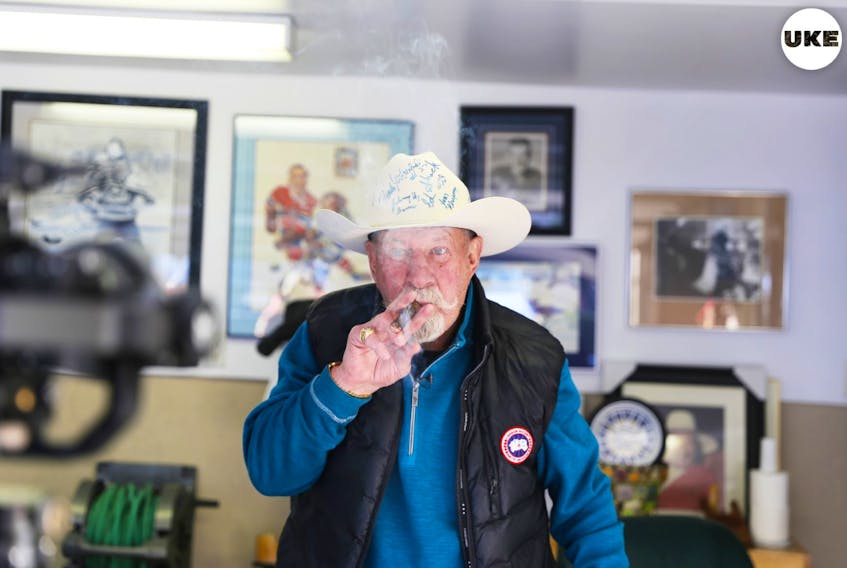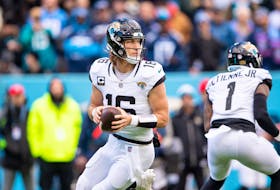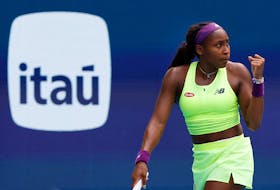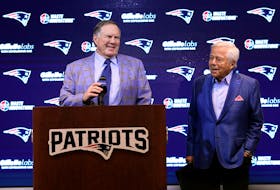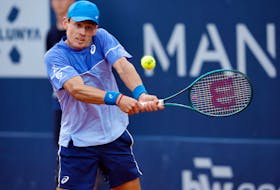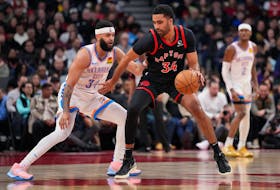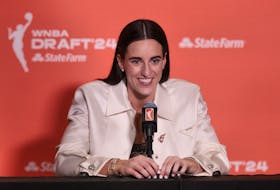The Flying Frenchmen, the Russian Revolution, Super Swedes, the struggles of Black players, a German-heavy 2020 NHL draft — all are part of seeking identity in hockey’s ever-changing demographic.
But never forget the Ukes , title of a new documentary by Volodymyr Mula.
“More than 50 players who have a Ukrainian background won the Stanley Cup,” pointed out the Kiev-based film maker, whose research team insists are the most non-North Americans to hoist the trophy. “I think a lot of people would be surprised at all the connections.
“Many older fans will have heard of the Uke Line (the Bruins’ Johnny Bucyk, Vic Stasiuk and Bronco Horvath from the late 1950s were the first trio in league history to notch 20 goals each), but the list includes Walter and Wayne Gretzky, right up to today.”
The 30-year-old Mula went back and forth between Ukraine and North America for two years conducting many interviews, including the famous father and son from Brantford, Ont.
“The most Ukrainians living outside Ukraine and Russia are in Canada,” reminded Wayne in the film.
Indeed, an estimated 1.35 million of full or partial origin live here according to 2016 census data, the country’s 11th largest ethnic group. The first wave began in the late 1800s, with a large settlement east of Edmonton, with further incentives in both countries swelling numbers to roughly 170,000 coming up to 1914.
Clifford Sifton, Minister of the Interior from 1896-1905, came under some criticism for enticing Ukrainians and not more immigrants from what had been traditional departure points; the United Kingdom, the U.S., Scandinavia and Western Europe. Later, it was personal survival that prompted many to leave the many turmoils at home.
Yet their descendants did Canada proud; Cup winners Gretzky, Ken Daneyko, Bruce Driver, Jeff Chychrun and Ruslan Fedotenko in this era and back to Orest Kindrachuk, Bucyk, Stasiuk, Eddie Shack, Turk Broda, Eric Nesterenko and Terry Sawchuk. Other notables who didn’t win a Cup were defenceman Alexei Zhitnik, a veteran of 1,000 games.
The first netminder The Great One ever faced was his Ukrainan-Polish grandma, who sat in a living room armchair and tried to block his mini-stick shots. In the film, Walter said his father Anthony’s family were wealthy landowners with a big farm, but feared the suppression of the Russian Communists after World War One. Walter’s mother was already here, arriving in 1921 as an 18-year-old.
“My father saw what was happening, so they sold and left,” Walter said. “I learned Ukrainian first because my mother didn’t know how to speak English until later when her kids grew up. So Ukraine is the motherland of our family.”
Mula had extensive chats with Bucyk and Daneyko. Ukrainian greats who’ve passed on include Horvath, Shack (his clip in the film is among the final interviews The Entertainer gave before he died this year) and the man in goal for the Maple Leafs’ last Cup, perhaps the most well known ‘Uke’ of all.
“They called my Dad ‘Ukey’ all the time,” said Jerry Sawchuk, Terry’s son. “It just stuck on him everywhere he went.”
Mula, a former sports reporter who made previous films about Ukrainian immigration, including ‘American Dream’, will be premiering the doc in his homeland in December and hopes COVID-19 will not interfere with planned showings in Toronto, Ottawa, Winnipeg and Vancouver in 2021.
“Their journey of 100 years isn’t forgotten,” he said. “Many of the players’ parents and grandparents fled to escape Bolshevism, yet they passed down the Ukrainian language and culture to the players.
“Their quickest education to Canada was through hockey. It must have been tough on them at first, but they are a hard-working people and that (was manifested) through hockey. It was a way to adapt and receive recognition.
“I’ve seen a lot of their family photo albums. They still remember. It’s a great story — and sometimes a heart breaking story.”
ICE COLD WAR
How ’bout some Cold War on ice?
A couple of months ago, Universal in Canada released on digital and on demand, the tragic-comedy documentary Red Penguins . Debuting at last year’s Toronto International Film Festival, the 80-minute film pieces together the plight of the failing Red Army team following the collapse of the Soviet Union and the Pittsburgh Penguins’ attempt to rescue and re-brand the club, American-style.
The Pens put a young marketing dynamo named Steve Warshaw in command and soon a dilapidated rink where squatters were living in abandoned private suites was doing a roaring business again. Younger Muscovites, who had the Iron Curtain smothering their social lives, were thrilled at the 180-degree turn from old school to raunchy entertainment.
There were dancing bears chugging Iron City beer brought from the Pitt, strippers, free booze nights and even a Boris Yeltsin look-a-like contest.
Customers were happy and so were Pens’ execs, such as Howard Baldwin and investors that included Canadian actor Michael J. Fox. The Disney corporation wanted in, smelling profit via improved international relations. Even stoic Soviet-era coach Viktor Tikhonov went along with the capitalists’ radical moves, to a degree.
But loose cannon Warshaw got caught up in the dangerously accelerated pace of change in the country. As seedy locals fought for control of the unregulated economy, the club wound up caught in the middle. There are candid interviews with Warshaw and the Russians and it doesn’t end well for one or two characters we get to know in the film.
Director Gabe Polsky, who did such a fine job examining the same team’s glory years in Red Army , catches the spirit of the wild times in this film, spiced up with vintage game clips from both sides of the pond that fans will appreciate.
Copyright Postmedia Network Inc., 2020

